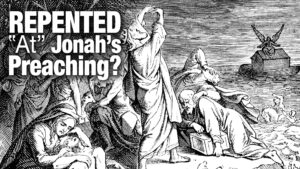http://www.oldpaths.com/Archive/Davison/Roy/Allen/1940/En01JC-TemporaryThings.html
From the swirling galaxies to the minutest particles, all is in motion.
All physical things change, and pass away. Our bodies grow old and die. Is
that the end?
Paul wrote: “Therefore we do not lose heart. Even though our
outward man is perishing, yet the inward man is being renewed day by
day. For our light affliction, which is but for a moment, is working for us a
far more exceeding and eternal weight of glory, while we do not look at
the things which are seen, but at the things which are not seen. For the
things which are seen are temporary, but the things which are not seen
are eternal” (2 Corinthians 4:16-18).
Things which are seen are temporary.
This biblical statement is verified by scientific observations. The
mass-energy space-time universe of which our bodies are a part, is
disintegrating. There is a continual increase of entropy. Matter and energy
in the universe are degrading toward an ultimate state of inert uniformity.
Jesus said: “Heaven and earth will pass away” (Luke 21:33).
The universe changes continually. Scientists observe these changes,
look for patterns and attempt to explain them. Their explanations are
often speculative because of the time-space limitations of their
observation equipment.
These limitations exist both in the study of the minutest particles
and in the study of the great expanses of the universe.
Since 1929 atom smashers have been used to study increasingly
smaller particles [see Ernest Thomas Sinton Walton and John Douglas
Cockcroft].
On September 10, 2008 the first beam of particles was successfully
steered around the 27 kilometer circular tunnel of the world's most
powerful particle accelerator at the CERN laboratory at Geneva. The
purpose of this cyclotron, an electromagnetic machine that took 20 years
to build with a price tag of ten billion dollars, is to accomplish a head-on
collision of two beams of sub-atomic particles, hurtling through the tunnel
at almost the speed of light.
To accomplish this, the electromagnets must be synchronized to less
than a billionth of a second and the entire tunnel must be chilled to minus
271.23°C, which is only 1.82°C above absolute zero. By observing what
happens when the beams collide, the scientists hope to increase their
knowledge of particle physics.
The presumptuous claim has been made by some that this Large
Hadron Collider (LHC) at Geneva will allow scientists to replicate
conditions that prevailed in the first few seconds after an alleged 'big
bang' that supposedly created the universe 13.7 billion years ago.
Such collisions occur naturally, however, in the outer atmosphere,
and are miniscule compared to what would happen in an alleged big bang.
A collider just makes it possible to set up measuring instruments near
these little bangs.
The first collision was to be attempted before the end of 2008, but
on September 19, 2008 a malfunction that caused the leakage of a
thousand kilos of liquid helium made it necessary to warm up the tunnel
for repairs. Plans for the first collision were postponed until the summer of
2009, but the actual first collision (at half speed) was not accomplished
until March 30, 2010.
King Solomon (an accomplished biologist - 1 Kings 4:33) wrote: “He
has made everything beautiful in its time. Also He has put eternity in their
hearts, except that no one can find out the work that God does from
beginning to end” (Ecclesiastes 3:11).
People have eternity in their hearts. They want to know more, they
can unravel some things, but their knowledge remains extremely limited.
No matter how powerful the colliders become, there will always be a
limit to what instruments can measure. As a modest scientist at CERN
said: “Hopefully this collider will help us peal off another layer of the
unknown.”
Observations of the expanses of the universe are also extremely
limited, in this case by distance and the slowness of light. If our sun
exploded five minutes ago, we would not yet know it since it takes eight
minutes for sunlight to travel to earth. The next closest star is Alpha
Centauri, 4.3 light years away. If God destroyed the entire universe
except our solar system four years ago, we would not yet notice it.
Earth is in the Milky Way galaxy. It is about 100,000 light years
across and has some 100 billion stars. Earth is 30,000 light years from the
center. Thus, all observations of our own little galaxy are stale-dated by
from 4 to 70,000 years.
The nearest galaxy beyond the Milky Way is Andromeda, which is
2.7 million light years away. Thus, observations of it are 2.7 million years
after the fact. What might have happened to Andromeda in the last 2.7
million years? We can never know. Maybe Andromeda no longer exists.
How many galaxies are there? About two million have been
observed, but there may be as many as 100,000 million. How big is the
observable universe? With our limited telescopes, it is estimated at 156
billion light years across.
“'My thoughts are not your thoughts, nor are your ways My ways,'
says the Lord. 'For as the heavens are higher than the earth, so are My
ways higher than your ways, and My thoughts than your thoughts” (Isaiah
55:8, 9).
What do scientists really know about the universe? Not much. They
do know that it is changing, that it had a beginning, and that it will have
an end. When you see a burning candle, you know it cannot burn forever
because the available fuel is limited. You also know it has not been
burning for ever, because then it would already be burned out.
Peter wrote: “The end of all things is at hand” (1 Peter 4:7) and “the
heavens will pass away with a great noise” (2 Peter 3:10).
Was this temporary universe created by an eternal God or by a big bang?
On what is the big-bang theory based?
Assuming that the red-shift in the light spectrum of distant stars is
caused by the Doppler effect rather than by some unknown influence over
such a great distance, the universe appears to be expanding.
Some scientists crank the expansion of the universe back in time
until all matter in the universe theoretically would have been at one place
(which seems rather preposterous). Since they can go no farther, they
postulate that there must have been an explosion at that time, a 'big
bang', that started the universe expanding. (I suppose if all the matter in
the universe were at one place, something would have to happen! But
how did it get there?)
These scientists can believe the preposterous idea that all matter in
the universe could be at one place, but they have difficulty with the idea
that God could create an already expanding universe, and that the stars,
plus their radiation fields in the whole universe, could be created
simultaneously. This, however, is not a bit more difficult than having all
the material of the universe at one place!
What do the Scriptures say about the beginning of the universe? “In
the beginning God created the heavens and the earth. The earth was
without form, and void; and darkness was on the face of the deep. And
the Spirit of God was hovering over the face of the waters. Then God said,
'Let there be light'; and there was light. And God saw the light, that it was
good; and God divided the light from the darkness. God called the light
Day, and the darkness He called Night. So the evening and the morning
were the first day. Then God said, 'Let there be a firmament in the midst
of the waters, and let it divide the waters from the waters.' Thus God
made the firmament, and divided the waters which were under the
firmament from the waters which were above the firmament; and it was
so. And God called the firmament heaven. So the evening and the
morning were the second day” (Genesis 1:1-8).
The waters under and above the firmament refer to earth's water
cycle with liquid water in the seas and water vapor in the clouds.
Notice that light, day and night, and the hydrosphere were created
before there were stars. The stars were not created until the forth day.
“Then God said, 'Let there be lights in the firmament of the heavens to
divide the day from the night; and let them be for signs and seasons, and
for days and years; and let them be for lights in the firmament of the
heavens to give light on the earth'; and it was so. Then God made two
great lights: the greater light to rule the day, and the lesser light to rule
the night, the stars also. God set them in the firmament of the heavens to
give light on the earth, and to rule over the day and over the night, and to
divide the light from the darkness” (Genesis 1:14-18).
Thus, when the heavenly bodies were created, they were visible on
earth (although some of them were millions of light years away) and their
coordinates were comparable to what we see now since they were given
for signs and seasons.
The book of Job (which tells of events around the time of Abraham
in Genesis) mentions the constellations, the Bear, Orion, and the Pleiades
(Job 9:9) and in Amos 5:8 it is stated: “He made the Pleiades and Orion.”
Thus, God created these constellations with their recognizable appearance
from earth.
God created the sun, moon and stars “to give light on the earth”
(Genesis 1:15). This tremendous, awe-inspiring universe was made to
enlighten man.
What do the Scriptures say about the entropy and inevitable death
of the universe? “Of old You laid the foundation of the earth, and the
heavens are the work of Your hands. They will perish, but You will endure;
yes, they will all grow old like a garment; like a cloak You will change
them, and they will be changed. But You are the same, and Your years will
have no end” (Psalm 102:26-28).
Peter writes: “But the day of the Lord will come as a thief in the
night, in which the heavens will pass away with a great noise, and the
elements will melt with fervent heat” (2 Peter 3:10).
We need not be discouraged or dismayed because of the changes
and decay around us. This changing universe will pass away, the elements
will perish, but there are invisible things that will remain: “We do not look
at the things which are seen, but at the things which are not seen. For the
things which are seen are temporary, but the things which are not seen
are eternal” (2 Corinthians 4:18).
Visible things change, but “Jesus Christ is the same, yesterday,
today, and forever” (Hebrews 13:8). And He has promised those who
follow Him an eternal dwelling place.
“Therefore, since all these things will be dissolved, what manner of
persons ought you to be in holy conduct and godliness, looking for and
hastening the coming of the day of God, because of which the heavens
will be dissolved, being on fire, and the elements will melt with fervent
heat? Nevertheless we, according to His promise, look for new heavens
and a new earth in which righteousness dwells” (2 Peter 3:11-13).
Next we will discuss unseen things that never pass away.
“You, O LORD, shall endure forever” ... “Of old You laid the
foundation of the earth, and the heavens are the work of Your hands.
They will perish, but You will endure; yes, they will all grow old like a
garment; like a cloak You will change them, and they will be changed. But
You are the same, and Your years will have no end”
(Psalm 102:12, 25-27).
Roy Davison













